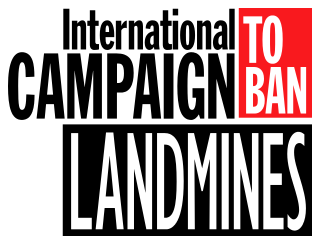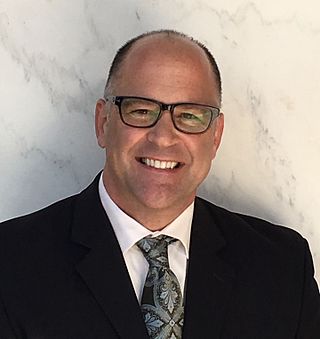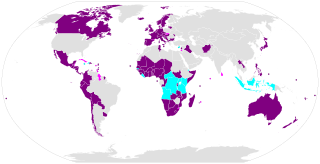
A cluster munition is a form of air-dropped or ground-launched explosive weapon that releases or ejects smaller submunitions. Commonly, this is a cluster bomb that ejects explosive bomblets that are designed to kill personnel and destroy vehicles. Other cluster munitions are designed to destroy runways or electric power transmission lines.
The Vietnam Veterans of America Foundation (VVAF), established in 1980, now the Veterans for America (VFA), is a Washington, D.C.-based international humanitarian organization that addresses the consequences of war and conflict. The founder of VVAF is Bobby Muller, a former U.S. Marine lieutenant and Vietnam veteran.

Jody Williams is an American political activist known for her work in banning anti-personnel landmines, her defense of human rights, and her efforts to promote new understandings of security in today's world. She was awarded the Nobel Peace Prize in 1997 for her work toward the banning and clearing of anti-personnel mines.

The International Campaign to Ban Landmines (ICBL) is a coalition of non-governmental organizations whose stated objective is a world free of anti-personnel mines and cluster munitions, where mine and cluster munitions survivors see their rights respected and can lead fulfilling lives.

The HALO Trust is a humanitarian non-government organisation which primarily works to clear landmines and other explosive devices left behind by conflicts. With over 10,000 staff worldwide, HALO has operations in 28 countries. Its largest operation is in Afghanistan, where the organization continues to operate under the Taliban regime that took power in August 2021.

The Convention on the Prohibition of the Use, Stockpiling, Production and Transfer of Anti-Personnel Mines and on their Destruction of 1997, known informally as the Ottawa Treaty, the Anti-Personnel Mine Ban Convention, or often simply the Mine Ban Treaty, aims at eliminating anti-personnel landmines (APLs) around the world.

The Manitoba Campaign to Ban Landmines (MBCBL) was Canada's only provincial campaign to ban landmines. It was a registered non-profit organization in the province of Manitoba. The MBCBL was a member of the 1997 Nobel Peace Prize co-laureate International Campaign to Ban Landmines (ICBL), Mines Action Canada, and the Cluster Munition Coalition.

Jerry White is Executive Director of the United Religions Initiative. He co-founded the Survivor Corps, formerly the Landmine Survivors Network, created by and for survivors to help victims of war, and is a member of the International Campaign to Ban Landmines, which was the recipient of the 1997 Nobel Peace Prize. He was a Professor of Practice at the University of Virginia from 2015 to 2022. He is a Senior Ashoka Fellow and a Gabelli Fellow at the Gabelli School of Business in New York City.
The Cluster Munition Coalition (CMC) is an international civil society movement, which campaigns against the use, production, stockpiling, and transfer of cluster munitions. Cluster munitions, a type of munition stockpiled by more than 80 states, are documented to have caused significant civilian deaths and injuries and have frequently caused indiscriminate effects in both conflict and peace times. Their use is prohibited under the 2008 Convention on Cluster Munitions, a convention formally endorsed on May 30, 2008, in Dublin, Ireland, and was signed by 94 countries in Oslo on December 3-4, 2008. The Convention entered into force, becoming binding upon state parties to the convention on August 1, 2010, after 30 countries formally ratified it. As of January 4, 2012, it had been signed by 111 countries, of which 77 have ratified.

Humanity & Inclusion is an international non-governmental organization. It was founded in 1982 to provide help in refugee camps in Cambodia and Thailand. Headquartered in France and Belgium, since its creation, it has opened branches in six other countries : Switzerland, Luxembourg, United Kingdom, Germany, Canada and the United States.

Kenneth R. Rutherford is the co-founder of the Survivor Corps, a group that helps the victims of war, and an American researcher in the field of political science. He is also a member of the International Campaign to Ban Landmines, which was the recipient of the 1997 Nobel Peace Prize. Rutherford has served as the Director of the James Madison University Center for International Stabilization and Recovery, a Peace Corps Volunteer in Mauritania (1987-1989), a UNHCR Emergency Refugee Coordinator in Senegal (1989), and a humanitarian emergency relief officer in northern Kenya and Somalia (1993). In 2024, Rutherford taught at Hue University in Vietnam as a Fulbright Scholar Fellow.
Mine action is a combination of humanitarian aid and development studies that aims to remove landmines and reduce the social, economic and environmental impact of them and the explosive remnants of war (ERW).
The Swiss Campaign to Ban Landmines is a member of the International Campaign to Ban Landmines (ICBL). It is an umbrella organisation composed of about 50 Swiss NGOs gathered around the common objective of banning antipersonnel landmines and similar indiscriminate weapons. At the national level, the Swiss Campaign to Ban Landmines successfully advocated in favor of a national ban of antipersonnel landmines and of Switzerland’s signature and ratification of the Ottawa Treaty in 1995-1997. Within the ICBL, the Swiss Campaign was a member of the Non State Actors Working Group, which it co-chaired until the end of 2004.

The Convention on Cluster Munitions (CCM) is an international treaty that prohibits all use, transfer, production, and stockpiling of cluster munitions, a type of explosive weapon which scatters submunitions ("bomblets") over an area. Additionally, the convention establishes a framework to support victim assistance, clearance of contaminated sites, risk reduction education, and stockpile destruction. The convention was adopted on 30 May 2008 in Dublin, and was opened for signature on 3 December 2008 in Oslo. It entered into force on 1 August 2010, six months after it was ratified by 30 states. As of December 2023, a total of 124 states are committed to the goal of the convention, with 112 states that have ratified it, and 12 states that have signed the convention but not yet ratified it.
The Uganda Landmine Survivors Association (ULSA) is a non-governmental organization, focused primarily on advocacy and victim assistance throughout Uganda. The organization was founded in April 2005 in order to campaign against the use, production and transfer of landmines, cluster munitions and explosive remnants of war (ERWs). ULSA also serves as a peer to peer support network for survivors, providing them with training in vocational, leadership and advocacy skills in partnership with other organizations throughout Northern and Western Uganda.

The Cluster Munitions Ban Advocates are a group of individuals whose lives have been affected by cluster munitions, a particular type of explosive weapon that has been banned for its indiscriminate area effects and risk from unexploded ordnance. They come from Afghanistan, Albania, Cambodia, Croatia, Ethiopia, Iraq, Laos, Lebanon, Tajikistan, Serbia and Vietnam. The Ban Advocates took an active role in the Oslo Process on cluster munitions that led to the Convention on Cluster Munitions, a treaty banning cluster munitions and providing innovative provisions to assist the victims of these weapons. The Ban Advocates initiative was launched in October 2007 by Handicap International Belgium, a founding member of the Nobel Peace Prize-winning International Campaign to Ban Landmines. The Ban Advocates spoke in front of the international community on many occasions.

The United Nations Mine Action Service (UNMAS) is a service located within the United Nations Department of Peacekeeping Operations that specializes in coordinating and implementing activities to limit the threat posed by mines, explosive remnants of war and improvised explosive devices.
Raphael F. J. McGrath, usually known as Rae McGrath, lives in Langrigg, Cumbria and is a British campaigner and specialist in humanitarian response to conflict and natural disaster. He founded the Mines Advisory Group (MAG), and, as a leading member of the International Campaign to Ban Landmines (ICBL), represented the organisation when it received the Nobel Prize for Peace in 1997.
The Organization of Amputees Republike Srpske (UDAS) is registered as a nonprofit organization and non-governmental organization based in Banja Luka, Bosnia and Herzegovina (BiH), founded by amputees which are mostly landmine victims in order to provides support for victims of landmines, unexploded ordnance (UXO), cluster munition and other persons with disabilities and their families to integrate them back into the community, thus enabling them to live normal lives.

ITF Enhancing Human Security is a humanitarian, non-profit organization founded by the Republic of Slovenia., which specializes in land mine clearance and post-conflict reconstruction. It was established on 12 March 1998 with the purpose of helping Bosnia and Herzegovina in its post-conflict rehabilitation, specifically with mine clearance and assistance to mine victims.













